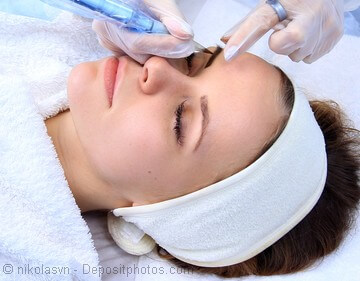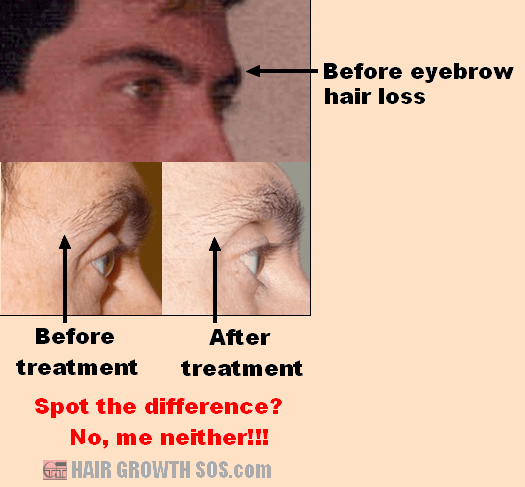- Home
- Causes of Hair Loss
- Eyebrow Hair Loss
What Causes Eyebrow Hair Loss? And How Do You Treat it?
By Paul Taylor
Eyebrow hair loss can be a real problem if it gets severe and permanent. That's because, without eyebrows, the face can look very odd indeed.
The
most severe it can get is through the autoimmune diseases alopecia
totalis and alopecia universalis (both of which are extreme
versions of the related condition alopecia areata). But, as you'll see below, thyroid conditions can also adversely affect eyebrow hair growth.
Alopecia Totalis and Universalis
As the names suggest, totalis and universalis can cause total eyebrow alopecia (i.e., complete loss of all eyebrow hair).
And given that these two conditions can be permanent, anyone affected by them might just have to learn to live without their eyebrows, or deal with it in some other way.
Treatment
First of all, a hair transplant won't help. That’s because, in these autoimmune diseases, the body attacks its own hair follicles.
Which means that any remaining hair you might* have somewhere on the rest of your body can't be transplanted because it would still be attacked by the immune system.
* Chances are you wouldn't have any available donor hair that’s suitable anyway.
Also, eyebrow hair is different from hair elsewhere on the body. Eyebrows only produce short hairs. That's because the growing phase of the eyebrow hair growth cycle lasts just weeks (1) whereas, the scalp hair growth cycle last years.
There are just a few other types of hair with similar
characteristics as the eyebrows (e.g., maybe hair from the back of the neck). And these
might be suitable for an eyebrow hair transplant if if weren't for the
autoimmune aspect of alopecia totalis and universalis.
So, instead, getting an eyebrow tattoo or using an eyebrow pencil might be a better way to get your eyebrows back.

Learn more about alopecia areata, totalis and universalis.
Thyroid Conditions
Less severe forms of eyebrow hair loss can slowly develop from thyroid conditions, particularly hypothyroidism. A common symptom of hypothyroidism is thinning hair or loss of hair from the outer third of both eyebrows.
Women are much more prone to thyroid disorders than men (2), which means it’s also more likely that women will suffer hair loss from their eyebrows too.
Treatment
It’s important not to simply try and treat the symptom that you can see (i.e., hair loss at the eyebrows). You’ve also got to deal with the underlying problem that caused it in the first place. And, in the case of hypothyroidism, there are several possible causes.
Learn about hypothyroidism and other thyroid conditions.
My own experience of eyebrow hair loss
I’ve suffered eyebrow hair loss myself.
For me, it was quite a gradual process, so I didn’t really notice it developing.
Then, one day, I just happened to realize that the outer third of my eyebrows had almost completely disappeared, with just a few hairs remaining (see the photos below).
Although I developed and successfully used my own techniques to reverse scalp hair loss, my methods can’t help the eyebrows.
So, instead, I decided to try a topically applied copper peptide product called Folligen.
From the photos below you can see that this idea didn't work out too well for me!
You can learn more by reading my review of copper peptide products.
Can You Completely Reverse Eyebrow Hair Loss?
If you’re young, there’s a good chance you can get your eyebrows growing properly again. The problem is though, thyroid conditions are slow to develop, making them difficult to detect.
So it’s quite possible that you could develop slow progressive eyebrow hair loss for several years* before you finally realize that a thyroid condition is behind it.
* The fact that elderly people are more likely to develop thyroid problems (3) might even be seen as an indicator of just how difficult it is for someone to suspect a thyroid disorder and then get a diagnosis to confirm it.
Hounding your doctor to get it checked out thoroughly is clearly what you’d need to do. And if you don’t even have eyebrow hair loss right now, but are keen to avoid it, getting regular blood tests to check your thyroid hormone levels is a good precaution to take.
A nutritional deficiency can often play a role in hair loss conditions too. So, any blood tests you have could also expose a deficiency (such as iron or iodine). In which case, taking a simple dietary supplement might help.
But, if you’re quite elderly, your body’s
metabolism is likely to be naturally slowing down. So, since
hypothyroidism also slows down the metabolism, it might be difficult to get both your rate of metabolism and your eyebrows back.
|
Like this page? |
|


